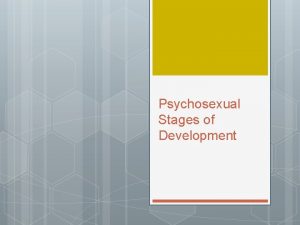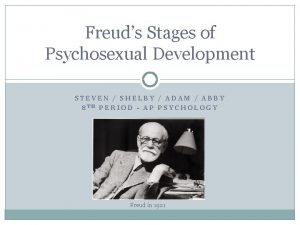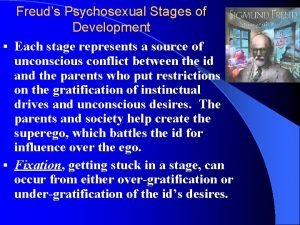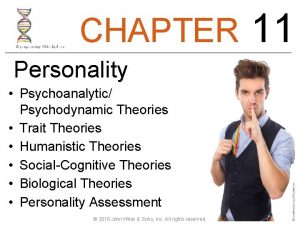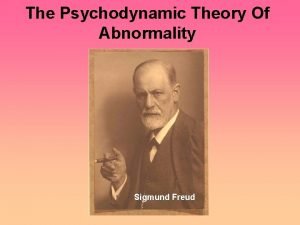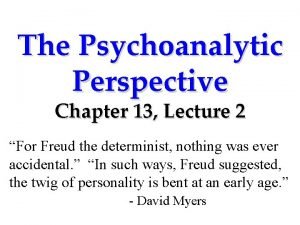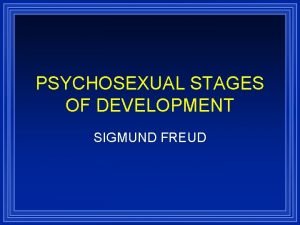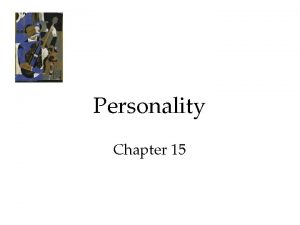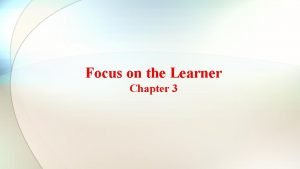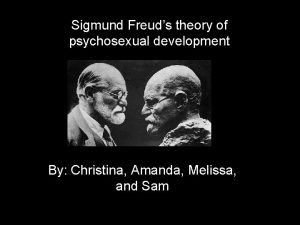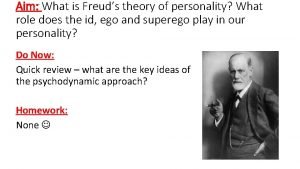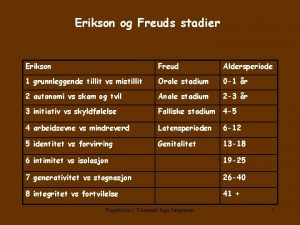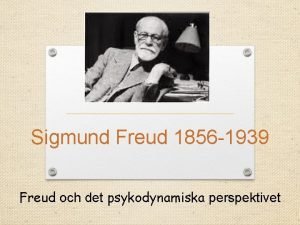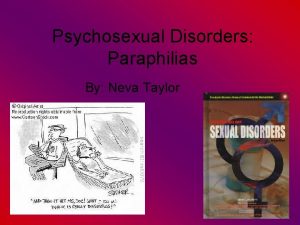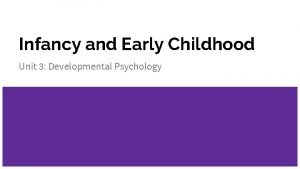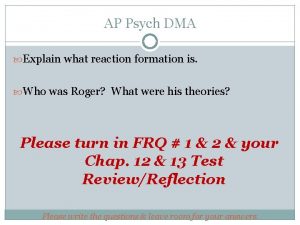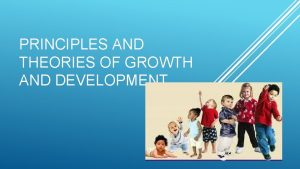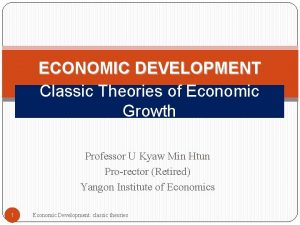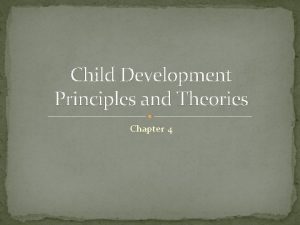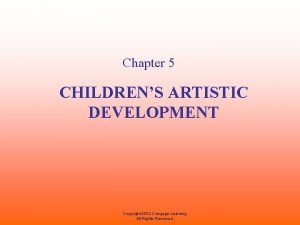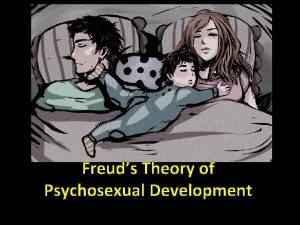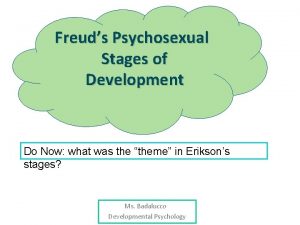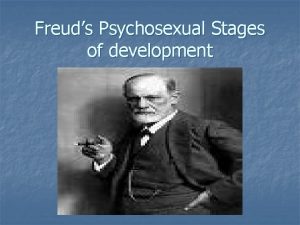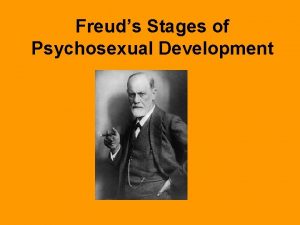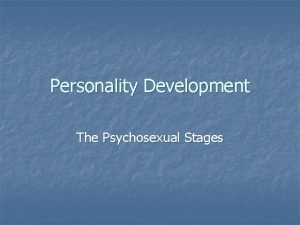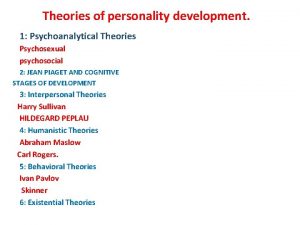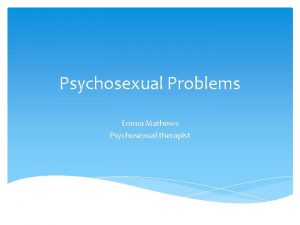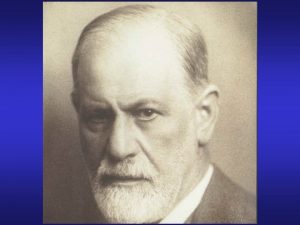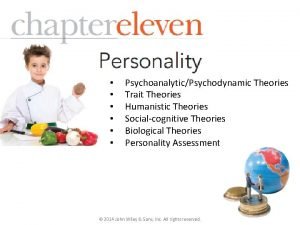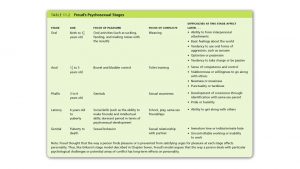Development Theories Freuds Stages of Psychosexual Development Freuds



























- Slides: 27

Development Theories

Freud’s Stages of Psychosexual Development • Freud’s theory of psychosexual develop is one of the best known, but most controversial. • He believed that personality develops through a series of childhood stages in which the pleasure-seeking Id is focused on certain erogenous areas. • This energy is the driving force behind behaviour. • If the stages are completed successfully, the result is a healthy personality. • If issues arise and are not resolved at the appropriate stage, fixation can occur (a person can get stuck in this stage).

Freud’s Stages of Psychosexual Development Stage Oral Age Description Birth-1 Pleasure is derived from oral activities such yr as sucking, biting & chewing. The primary conflict at this stage is the weaning process. Can lead to nail biting, smoking, and overeating Anal 1 -3 yrs Primary focus is on controlling bladder & bowel movements. Developing control leads to a sense of accomplishment & independence. The primary conflict at this stage is the toilet training process. Anal-explosive character Messy, cruel, destructive, generous and often creative Anal-retentive character Perfectionist, problems with constipation, neat and orderly

Freud’s Stages of Psychosexual Development Stage Phallic Latency Age Description 3 -6 yrs Pleasure comes from direct genital stimulation. Children develop desire for the opposite sex parent -Oedipus complex The desire for boys to possess their mothers and replace their fathers Comparable feelings in girls are also called the Electra complex -Castration anxiety -Penis envy 6 -11 With the development of the Ego & Superego, yrs sexual desires are suppressed & the focus becomes intellectual & social. Begins around the time children start school and are more concerned with peer relationships, hobbies, etc.

Freud’s Stages of Psychosexual Development Stage Age Genital Description 12 Strong sexual interest in others onwar develops. Adolescence is characterized d by learning how to express these urges in socially acceptable ways.

How Does Your Personality Develop? (write this in your notes) • According to Erikson, personality development is the result of a series of conflict resolutions over a person’s entire life. • People pass through eight stages of psychosocial development based on interactions between individuals and society.

1. Trust v. Mistrust Success • This stage occurs from birth to 1 year. • This is where children learn the ability to trust others but this depends on the love and care they received from their care givers. • If this stage is successful the child is able to gain confidence and security in the world he or she is in and is able to feel secure even when threatened.

Trust v. Mistrust Failure • If the child is unsuccessful at completing this stage then it can result in an inability to trust. • A development of a sense of fear about the inconsistent world. • May result in anxiety, heightened insecurities and a feeling of mistrust in the world around them.

2. Autonomy v. Shame and Doubt • Between the ages of 1 and 3 years. • Children start to use new mental and motor skills, they start to assert their independence. ex: picking which toy to play with, what to eat and wear • Autonomy is created when the parents allow reasonable freedom and encourage independence. • They become confident and secure in their own ability to survive in the world.

Autonomy v. Shame and Doubt • If the child is criticized, overly controlled or not given the chance to assert themselves, they begin to feel inadequate in their ability to survive. Ex: overly dependent, lack of self-esteem, shame and doubt in themselves

3. Initiative v. Guilt • The child is between 3 and 6 years old. • Children become more assertive in this stage and they begin to plan their own activities and games with others. • Through these opportunities children develop a sense of initiative, and start to feel secure about their ability to lead others and make decisions. • If there is too much criticism or control children develop a sense of guilt because they may feel like a nuisance to others and remain followers.

4. Industry v. Inferiority • The child between 6 and puberty. • Children develop a sense of pride in their accomplishments. They will initiate projects and see them through and feel good about their achievements. • If children are provided encouragement and reinforcement for their initiative they feel industrious and confident in their ability to achieve goals.

Industry v. Inferiority • Negatively if the child isn’t encouraged or is restricted by a parent or teacher then the child begins to feel inferior doubting his own abilities and therefore may not reach his potential.

5. Identity v. Role Confusion • Adolescent Stage: they try to discover who they are, and what their role is in society. • They explore possibilities and begin to form their identity based on the outcome of their exploration. • Lack of resolution in this area results in a sense of confusion about themselves and their role in the world. Ex: “I don’t know what I want to be when I grow up”

6. Intimacy v. Isolation • Young adulthood: start to work on establishing intimate ties with others. • Exploring relationships leading towards longer term commitments outside of the family. • Success in this area leads to comfortable relationships and sense of commitment.

Intimacy v. Isolation • If you are unsuccessful then you will avoid intimacy, fear commitment and relationships can lead to isolation, loneliness, and sometimes depression. • As a defense we can feel superior to others Ex: I’m too good for you. Ex: I CHOOSE to be alone.

7. Generativity v. Stagnation • Middle adulthood: we • Failing to achieve these things can make you establish our careers feel that your life is and settle down start stagnant, unproductive our own families. and meaningless • Generativity means giving back/ to the next generation through work, children, or caring for other people, and getting involved in the community.

8. Ego Integrity v. Despair • Old age: In this final stage, people reflect on what type of life they led. • Contemplate their accomplishments. • If they are not happy with their life, they feel guilt, despair and fear death. “Shoulda, Coulda, Woulda”

Jean Piaget: Cognitive Development • Began career as a biologist • Cognitive development (how people learn and use knowledge) is influenced by biological, social and psychological factors. • People pass through four operational stages of mental development that change with age.

Cognitive Development • Reality: perception of transformations & state – Transformations: changes a thing may undergo – States: static condition or appearance of a thing • Our intelligence must be adaptive: function to represent both the transformational and static aspects of a thing. • We learn and develop this skill over time as we pass through stages of cognitive development

How We Learn Schemas: Building blocks of knowledge – the skills that allow us to explore and experience our environment As we grow and develop we add more complex schemata Example: a baby grabs a rattle and thrusts it into his mouth

Assimilation, Accomodation & Adaptation Assimilation: transferring / applying a schema to a new situation / object Example: Baby also grabs daddy’s new watch and thrusts it into its mouth Accomodation: Adjusting an old schema to a new object. Example: When the baby encounters a ball, it cannot “grab and thrust”, for the ball is too large. Adaptation: Through a gradual process of assimilation and accommodation, the infant creates new schema for dealing with its environment = Learning Piaget believed we store these new schemata and apply them when needed.

• Sensorimotor Stage (0 -2 ) • • Infant uses senses and motor skills to explore and understand their world Early infants –lack object permanence - “out of sight, out of mind” Middle infants - object permanence begins to develop Late infant stage – pretend play – infants are able to solve simple problems http: //www. youtube. com/watch? v=l. Eam 9 lpa 6 TQ&feature=player_embe dded

Pre-Operational • • Age 2 -7 Language develops – initial development of symbolic representation Symbolic manipulation – pretend play – we can think in the absence of the actual object – infants cannot do this Children tend to focus, or center, on one aspect of a problem. A six year old might say “I don’t live in Canada, I live in Toronto” Children are very ego-centric they can view the world from their own perspective, but struggle to take the perspective of another Lack the ability to conserve things – volume of liquid

Concrete Operations • • Age 7 -12 Operations = the logical principles we use to solve problems We can use symbols to represent things, but also manipulate these symbols logically But, they must still perform these operations within the context of concrete (real) situations • • • Children can learn basic arithmetic Development of the ability to conserve volume and objects Also, children are able to de-center and take the perspective of others Which is heavier, a ton of lead or a ton of feathers?

Formal Operations • • • Age 12 – adulthood Development of abstract thinking and advanced problem solving skills – hypothetical thinking Moral reasoning is also a function of Formal Operations – we can understand that an action may be morally wrong even if it isn’t illegal, or that an action may be morally right, even if it breaks a law. We do not always function in the formal operational domain – in fact Piaget argued many of us never fully develop this manner of thinking Formal operations is not necessary to be successful – may even “impeded” success in some cases • Rule: if a card has a vowel on one side it has an even number on the other side. • Which cards do I have to turn over to test if this rule is true?

 Psychoanalytic theory
Psychoanalytic theory Phallic stage
Phallic stage Phallic character
Phallic character Freud stages mnemonic
Freud stages mnemonic Latency erogenous zone
Latency erogenous zone Social cognitive theory of personality examples
Social cognitive theory of personality examples Sigmund freud psychodynamic approach
Sigmund freud psychodynamic approach Freud psychosexual stages
Freud psychosexual stages What is erogenous zone of oral stage
What is erogenous zone of oral stage Bryce often acts overly confident and daring
Bryce often acts overly confident and daring Psychosexual development
Psychosexual development Phallic stage of development
Phallic stage of development Overdeveloped id
Overdeveloped id Freudian iceberg
Freudian iceberg über ich
über ich Freuds faser
Freuds faser Freuds faser
Freuds faser Genitala fasen
Genitala fasen Karen horney emphasized that childhood anxiety is caused by
Karen horney emphasized that childhood anxiety is caused by Neva taylor
Neva taylor Industry vs inferiority
Industry vs inferiority Anal personality
Anal personality Reaction formation psych
Reaction formation psych Different theories of growth and development
Different theories of growth and development Dualistic development thesis
Dualistic development thesis Child development principles
Child development principles Kellogg's artistic developmental stages
Kellogg's artistic developmental stages Telegraphic sentence meaning
Telegraphic sentence meaning

